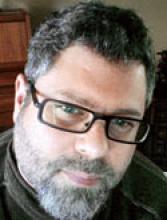“You can’t be serious. Pork! Pork is what you eat for breakfast, not fish, not lobster and definitely not sushi! What is this world coming to? Fish for breakfast? This is an outrage! Bacon, ham, sausage, eggs: these are proper breakfast foods. Everybody knows this!”
My sister-in-law was neither intimidated nor dissuaded by my passionate objection to her gourmet breakfast suggestion, but I amped up the Scottish humour and charm, and was eventually granted permission to eat a conventional western breakfast.
I can’t remember if she pointed out the absurdity of a follower of Jesus mockingly condemning the idea of fish for breakfast or if it came to me on my own. The irony, of course, being that the only documented breakfast of Jesus in the gospels recounts him not only eating fish, but him being the one to cook and serve it as well! What would Jesus do for breakfast as a Jew? Fish. Definitely not pork, Troy!
So why do most North American Christians I know, with the exception of my vegetarian friends and sister-in-law, have a strong conviction that bacon, sausage and ham are normal breakfast foods, and fish and lobster are not? Is this a universal timeless truth that is obvious to any reasonable person who actually thinks the matter through carefully and objectively?
Of course not. We have been conditioned to think this way. Philosopher and social scientist Michel Foucault proposed that we have all been conditioned to accept certain ideas and actions as normal, to the extent that they are taken for granted and seen as natural. He called this process “normalization.”
Every culture, subculture and family normalizes its members. Church culture is no exception. For instance, I was raised to sit very still and attentive in church as a child no matter how boring the service was. This was normal at our church. The “liberal” parents whose children didn’t conform to this norm were judged, as there was obviously something wrong with them and their prayer lives. The first time I visited a Mennonite church in 1998 I was shocked at the amount of noise and disturbance children were permitted to create. It became clear that this was normal for that congregation, but my gut reaction was that this was anything but normal. It was wrong. Especially when I was preaching.
It is common for humans to judge the product of another culture’s normalization process as wrong, bad or even evil, if it is different from our own. I remember the first time I visited a friend’s Pentecostal church when I was 16. At the end of the service everyone began speaking in tongues. I had never experienced anything like this before, and my immediate response was fear. I judged their behaviour as not only abnormal, but quite possibly demonic. Yet my Pentecostal friends had been raised to believe tongues were a normal part of the Christian life and were suspicious of believers like me who didn’t speak in tongues. I slowly came to realize that what was normal for me was not necessarily normal for others.
At their core, a lot of “worship wars” are cultural-norm conflicts. I have heard this argument repeated by many of my charismatic friends: “It is not natural to just sit there like a bump on a log, without so much as a smile, if you are really worshipping the God you love with your whole being!” I always respond: “True, it is not normal for you and your subculture, but it might be for some people.”
Many other believers have confidently informed me: “It is not natural or proper to be dancing, sipping coffee and waving your arms around in the air like you’re at a rock concert in the house of God!” I always respond: “True, it is not normal for you and your subculture, but it might be for some people.”
Our views on what is normal and natural are almost always a product of enculturation and normalization, rather than our grasp of universal timeless truth. Awareness that my norm is not the norm—or God-ordained ideal—has had a profound effect on my spiritual maturity, and has increased the peace and unity I experience with others, especially those different than I am. Having cultural norms and ideals are not a problem as long as I remain conscious that other people, cultures, denominations and religions have their norms as well.
I still don’t eat fish for breakfast, but now I see Christ in people who do.
Troy Watson is the spiritual life director of Quest Christian Community, St. Catharines, Ont.



Add new comment
Canadian Mennonite invites comments and encourages constructive discussion about our content. Actual full names (first and last) are required. Comments are moderated and may be edited. They will not appear online until approved and will be posted during business hours. Some comments may be reproduced in print.